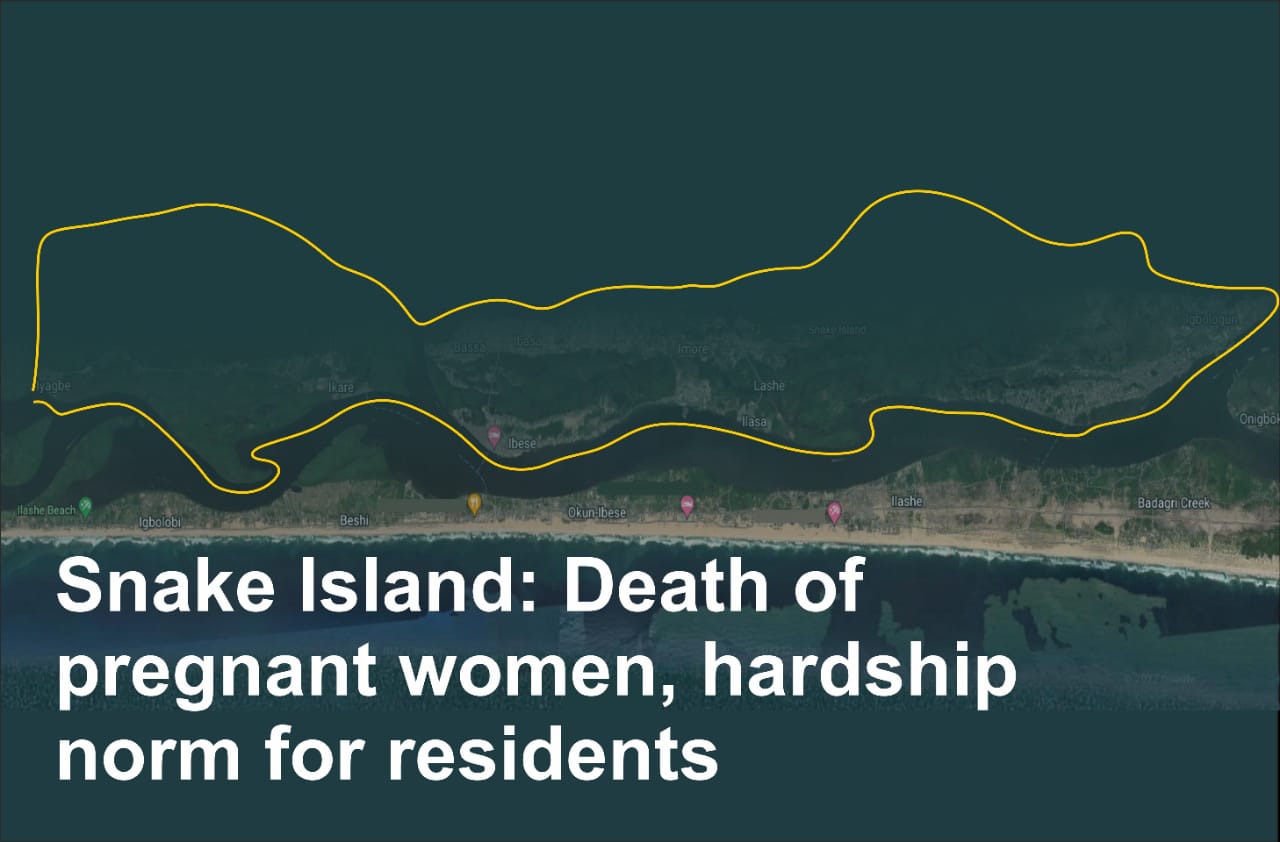
When Olushola Olarenwaju (not her real name) found out that she was pregnant with twins, she was elated. She earnestly looked forward to welcoming her bundles of joy.
But when the time to deliver the babies came, Olanrewaju’s joy was stifled. To get to a health facility where she would be delivered of her babies, she had to leave Ibasa, an island community in Amuwo Odofin Local Council of Lagos State.
She made the journey to Satellite Town where she boarded a bus that will take her to the hospital. Olanrewaju never made it to the hospital. She died with her twins stuck in traffic.
Tales of pregnant women dying are on the increase in Snake Island, where Ibasa is located, due to a lack of access to quality health care facilities.
The Snake Island has over 30, 000 residents and it can be accessed from Ijegun-Egba Jetty, in Satellite Town, Apapa, Badagry, and Ojo. It is also home to Ibeshe beach, and closer to Ilashe beach than CMS jetty. In addition to being home to Nigerdock Shipyard, it sits close to Nigeria’s busiest seaport.
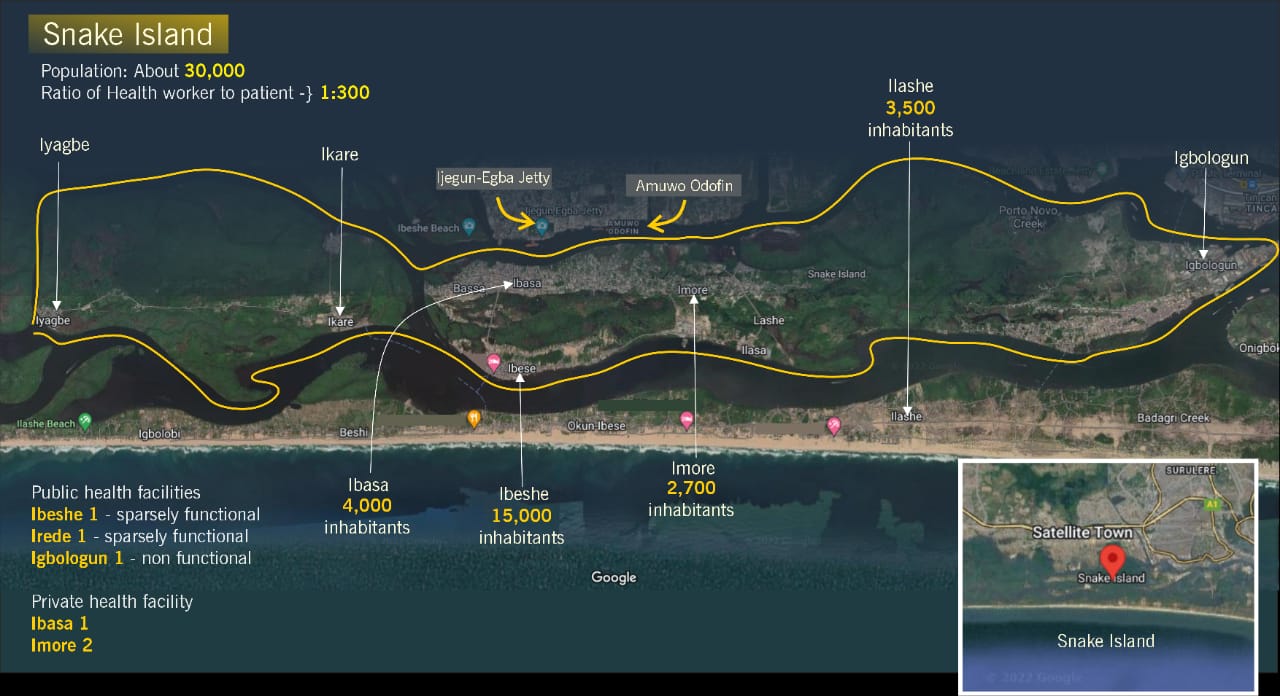
Comprised of Imore, Ibeshe, Irede, Ilashe, Ibasa, Igbologun, Igbo-Esenyore, Igbo-Osun, Ikare, and Iyagbe, all the 10 communities that makeup Snake Island live in perpetual fear of their pregnant women going into labour at night. Indeed, there are instances where some women have been forced to give birth in boats while on transit.
Chief Tajudeen Eletu, a community leader in Ilashe, narrated how a woman, gave birth in a boat as she was being taken to a hospital due to the strength of the waves, hitting the boat.
“I recall when a pregnant woman in our town, who was attending antenatal clinic in Ojo was about to put to bed, we reached out to boat skippers for transportation. She sat down in the middle of those that were accompanying her to the clinic. But the boat was bumping against the waves, which made her push and she gave birth to triplets.
“None of the people on board could attend to her or attempt to cut the umbilical cords attached to the mother. They had to use clothes to wrap the babies and the mother till they got to the hospital at Ebute Meta. And something like this has happened five times in my lifetime. This last one happened in 2021,” Eletu said.
According to residents of the area, these sad realities could have been mitigated if the island has a quality healthcare facility and workers that could attend to the medical needs of the locals. Many residents of Snake Island are fishermen and fishmongers. But pollution caused by oil tanks has impacted their means of livelihood. Consequently, younger residents now resort to ferrying visitors and residents across the river and also doing menial jobs.
Only recently, the state Commissioner for Information, Gbenga Omotoso, said that the state is building about 15 ferries, with some already completed and about to be commissioned soon. He could not confirm if any would be sited in Ijegun-Egba.
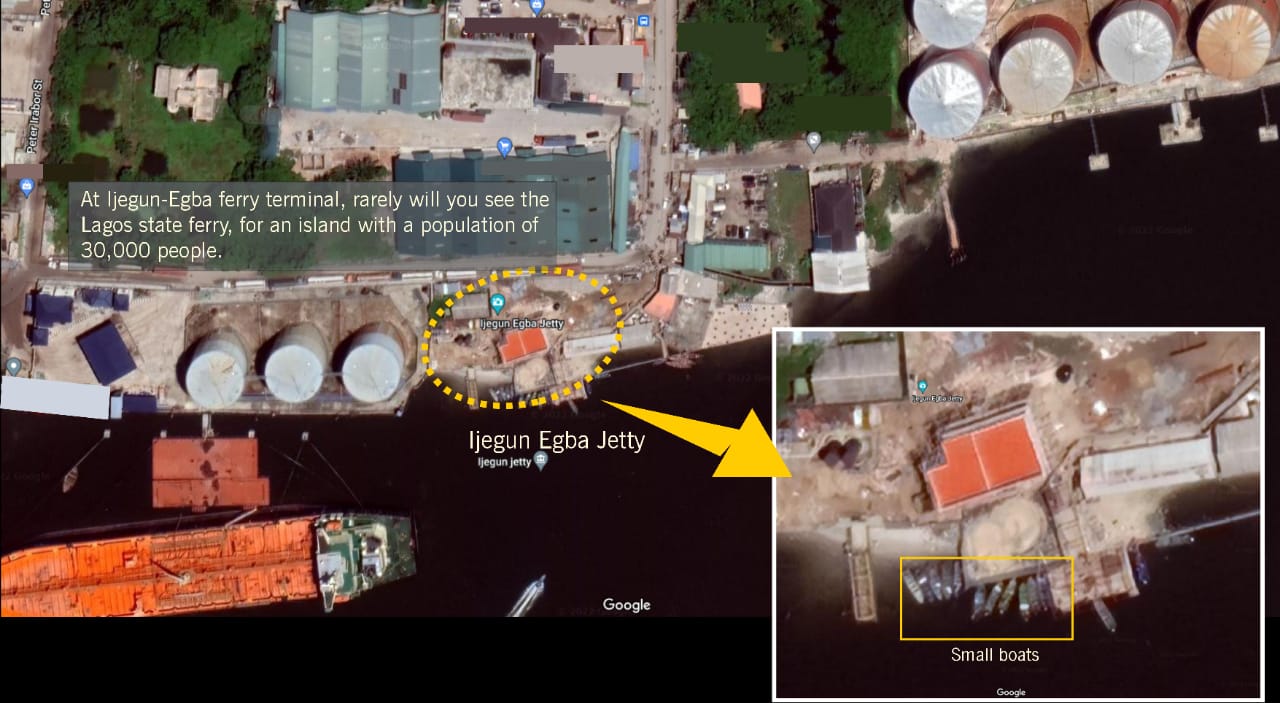
A primary health centre that is situated in Ibeshe is dilapidated, ill-equipped and lacks the required personnel. The alternative lies at the end of a five-hour journey.
State-owned ferry service does not cover the community. After a fairly smooth boat ride to the bank of Ibeshe community, the first building The Guardian noticed was the Ibeshe Police Station. A few steps further, is the Primary Health Centre (PHC) and a government primary school opposite it.
The nondescript, old building housing the PHC has no signage, and no gate, but the entire expanse of land is fenced, even as the general appearance and ambience of the facility do not indicate that lives could be saved there.
The centre has one security personnel, who was deployed there recently after a burglary attempt left the ceiling destroyed last April. The ceiling was yet to be fixed when The Guardian visited last month.
The only ward in the facility has seven beds, including an empty bunk. The PHC has one visible old air conditioning unit, and a completely unhygienic restroom, with a floor that looked like it has been unwashed for months.
There are no drugs in the health centre. The window nets are torn, and the two soak-away pits at the back of the building are uncovered. The health centre has only two workers – a community health worker, and a nurse.
One of the workers, who would not want her name mentioned, said that the PHC caters to pregnant women on Mondays, administers immunisation to children on Wednesdays, and gives COVID-19 vaccine on Fridays. It closes at 4 pm each day.
She stated that people in the community patronise both traditional birth attendants (TBA) and the PHC.
According to her, residents pay more using TBA than PHC, which is free, adding that she also patronises traditional birth attendants because they are familiar with the practice, and the superstition that their health challenges may have been caused by someone.
Even though they close by 4 pm, she explained that they remain in constant contact with pregnant women that are registered with them, a development she said helps in emergency cases.
In March, the PHC in Ibeshe claimed that 15, 512 children were delivered in the clinic, while in May, it recorded 621 childbirths, even though their population is said to be 15, 000. These statistics given by the clinic explained that more parents visit the clinic, despite the challenges bedeviling the community.
However, this information is in contrast with the data The Guardian gathered from people in the cause of an investigation, where the people revealed that a large number of women go across the water to give birth in towns.
Another observation was that there are just two health workers who offer medical attention to the entire population on the island.
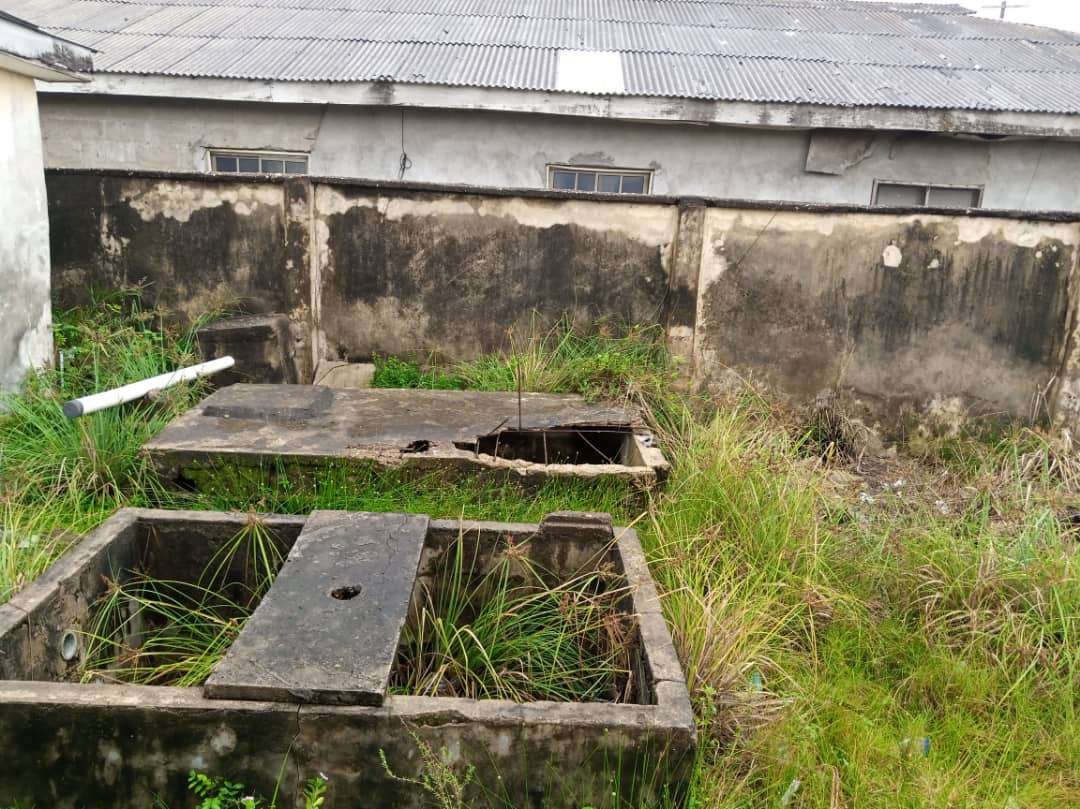
Many residents of the island drink sachet water. However, The Guardian noticed the presence of a borehole at the entrance to Ilashe Community, with five tanks, all with state government logos.
Imore also has some boreholes constructed by individuals, but the one in Ibeshe was non-functional.
This year, Lagos State has set aside the sum of N127.349b for “the continuous upgrading/rehabilitation of our health facilities, and completion of ongoing healthcare infrastructure, including Maternal and Child Care Centres (MCCs), construction of world-class medical park, continuous upgrading of e-health platform for health insurance scheme “ILERA EKO,” and the construction of the New Massey Children Hospital, General Hospital, Ojo, and the Construction of Cancer and Infectious Disease Research Institute, Yaba.”
But with less than six months to the end of the year, noting has been done in Ibeshe PHC.
On what per cent of the budget was allocated to the Snake Island community, Omotoso said that Governor Babajide Sanwo-Olu made it compulsory for every member of the State Executive Council to visit two PHCs.
He said that he was treated for malaria in one of the PHCs in Lagos without disclosing his identity to ascertain their functionality, and the state is making efforts toward improving PHCs.
He added that Lagos just launched a mobile clinic, a big boat that contains all essential health facilities that can be used for treatment advocacy, evacuation, and others for riverine areas. But it is not clear if the clinic will serve Snake Island.
Efforts to speak to the chairman of Oriade Local Council Development Area proved abortive as his office was uncooperative.
A community leader and Chief Odofin of Ibeshe, Olubolu Waliu, said the need to have an efficient PHC is a major challenge to his people, as the staff of the present facility comes only on Wednesdays.
He said in the case of a medical emergency, even at night, patients are ferried out of the island by boat.
He confirmed that cases abound where pregnant women die trying to get to the nearest hospital. He, however, noted that traditional medical practitioners who treat residents of malaria and typhoid fever only were still in the community.
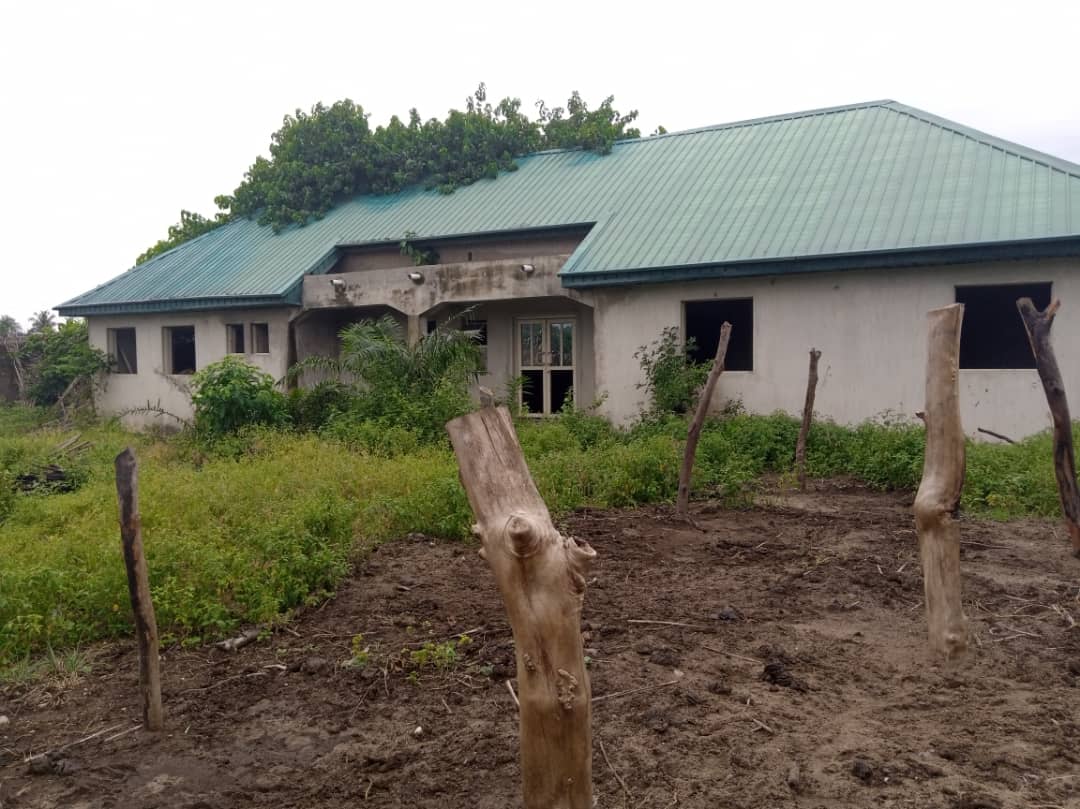
For the Imore Community, which is a 30-minute walk from Ibeshe, there is no PHC. A resident of the area, Adeshina Abusalam, who said that the community has three polling units, explained that Imore birthed Alakija (in Amuwo Odofin LG, Navy Town (both in Amuwo Odofin LG) Kirirkiri and Awodiora in Awori-Ajeromi Local Council.
The community in 2014, he said, gave the government a large expanse of land to build a health facility, but the project has been abandoned for nearly 10 years.
Worried about the absence of facilities, one of the community leaders, the Eletu of Imore, built a private clinic there. Imore has two private clinics and has not recorded any case of a pregnant woman dying while crossing the river for medical attention.
He said Imore settlers mostly cross the water to hospitals at Ajeronmi Ifelodun Local Council and the Mother and Child Centre in FESTAC.
He added that with the traffic snarl on the road, a journey that should take two hours from the terminal, sometimes take the entire day for.
The Eletu of Imore regretted that some residents of Imore still use TBAs, adding that most people patronise nurses even as the TBAs usually call the nurses for help when there are complications.
He called on the state government to provide a standard hospital for the island.
“Whenever our wives get pregnant, we usually take them to hospitals in Ojo, Eko, and Badagry. This happens through water transportation. Sometimes, they give birth in the boat,” Tajudeen lamented.
Even when they give birth in the boat, we just take both mother and child to the clinic for medical attention. We usually have a lot to deal with. But thank God for not allowing it to be more than what we can handle. Sometimes when the wind meets passengers at sea, it usually leads to boats capsizing.
“Again those steering the boats are from this Snake Island and they are knowledgeable about water. So, when they see the weather, they can foretell if it would be favourable to embark on the trip. So, they take precautions whenever there is wind and we have a water guard at the jetty to rescue such people. We haven’t experienced any mishaps this year, but last year, we experienced some. All the 10 passengers involved in those few accidents didn’t drown. They were all rescued,” the Eletu explained.
He said that residents of Imore visit the Ibeshe clinic quite often for immunisation. “They usually close by 4 p.m, but we have some people that we do call on the phone directly during emergencies,” he added.
Hasan Abisoye, who hails from Ilashe, said that there is no hospital in the community. So, people in the community go to neighbouring communities like Imore and Ibeshe for healthcare needs.
“At Imore, there are nurses who sell drugs. So, those are the people our wives give birth in their care, or with a woman called Mama Alagbo, while for immunisation, we go to Ibeshe every two or three weeks,” he said.
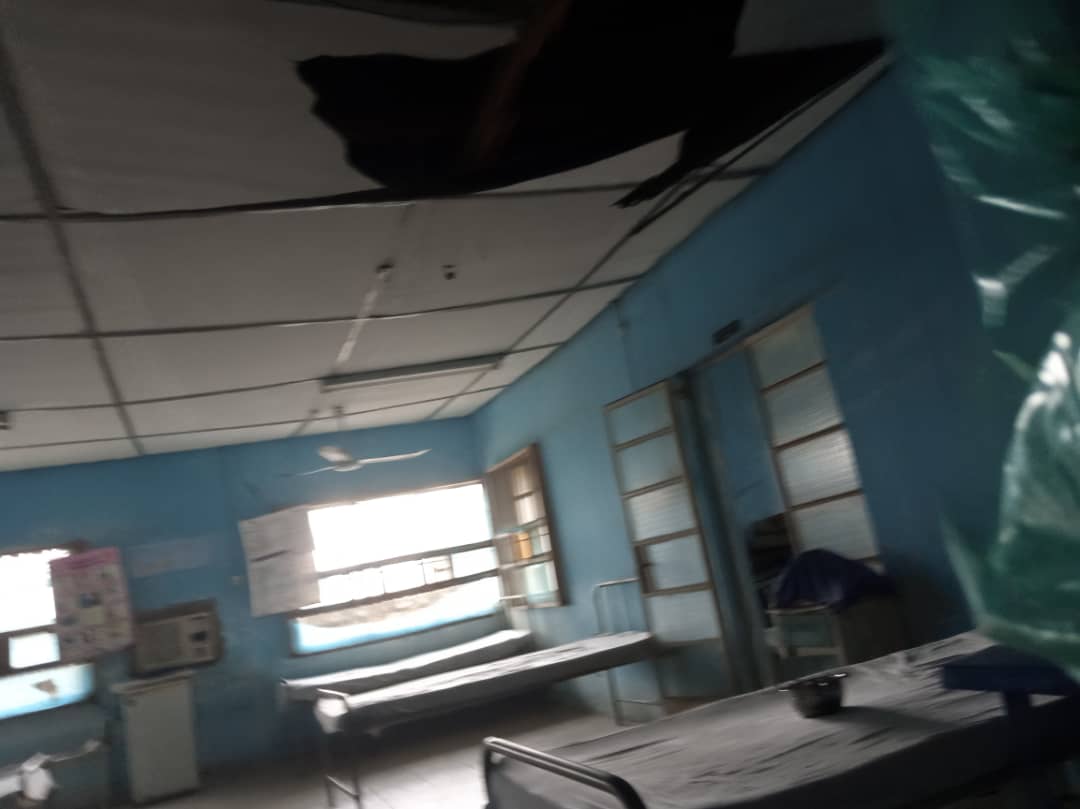
“Pregnant women in the area register with TBAs, where they begin to receive herbs as the pregnancy unfolds. If the TBA notices complications, the affected woman is rushed to Ijegun, Satellite Town, which takes about 10 minutes by boat. From there, she is taken to a hospital.”
He also explained that a certain medical doctor popularly called ‘Osheyo,’ who had a clinic in Ibasa, died about four years ago, but his hospital is still functional, adding that the people are blessed with strength, so they engage in blue-collar jobs.
Abisoye added, however, that how most youths in the community were working in a company called Castech, which was in operation during the President Goodluck Jonathan-led government, but shut down after the All Progressives Congress (APC) took over power.
Suratu Akinwumi, from Ilashe said: “The women here are suffering. When it comes to childbirth, we have some women who are good at traditional medicine. They are the ones who usually help our women out during child delivery. Sometimes, our women trek about 30 minutes to Ibeshe to access the health centre there because transportation is expensive here.
“We do record complications, but God has not allowed us to experience the one that is more than what we can handle. The major occupation of the women here is trading. They are also into farming. We have a coconut farm and God is helping us to survive. The COVID-19 period was very hard for us to even till now. We do not have water, so we buy sachet water every day. The few of us with boreholes try to connect the tap outside so that children can have access.
“The government is not doing us well at all in terms of health care and we are appealing that they should come and build hospitals here. We have land to give to them, what we get from them and people that visit us are promises.
• This story is supported by the Africa Data Hub Community Journalism Fellowship.






